Vinphonic
10-03-2017, 03:49 PM
The Legacy of Japanese Composers
Takayuki Hattori
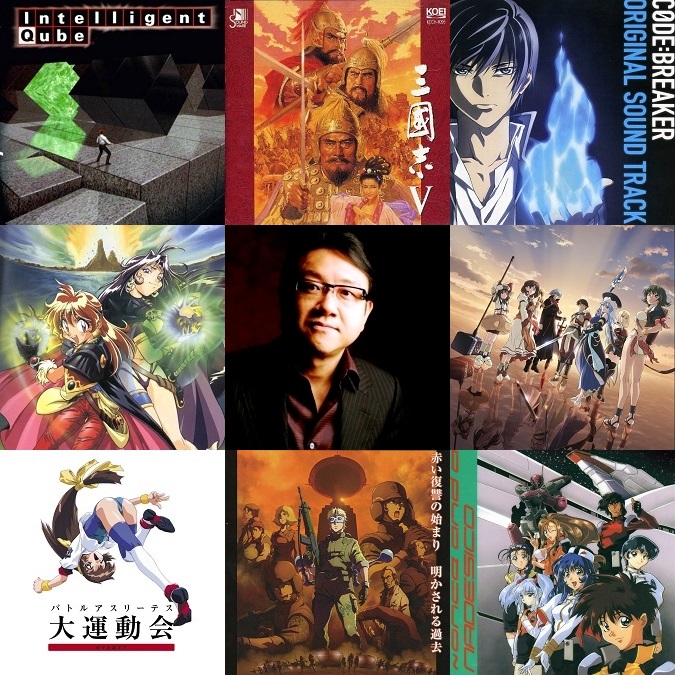
Takayuki Hattori is a brilliant symphonic mind and master tunesmith. From a certain angle a true Golden Age composer who has composed some of the most memorable TV themes ever and has many fantastic symphonic works under his belt. Like another certain composer I will highlight soon, his best work was written in his early years. Not to say he still can't knock it out of the park but I much adore what he composed for TV Drama and Anime in the 90s. From symphonic works full of grade A Hollywood moments and classical choral works to exhilerating period pieces, it's just all fantastic.
I should mention that some of his early works I don't pocess and to not rip cds all the time, the credit goes to nextday for Kura, Longest Tour and Restaurant. IQ and Nihon Retto were shared by Tango/Herr Salat. The rest is by myself, including Codebreaker in FLAC, which I believe was never shared on this forum (or elsewhere).
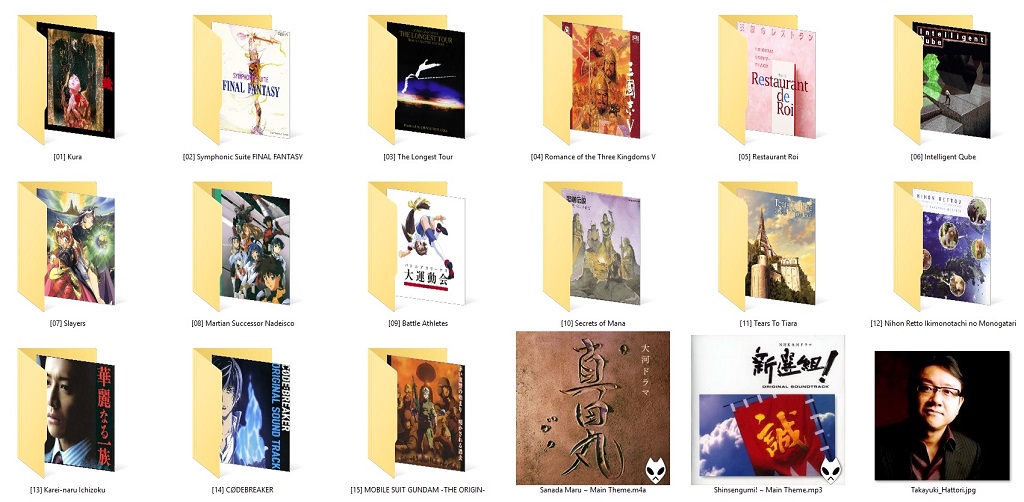
Hattori's early TV work gave us quite a symphonic journey, with "Kura" as one of his strongest works to date, elevated in sound by the Moscow Philharmonic and straight out from the Golden Age of cinema with many fantastic choral moments.
His mark on Final Fantasy is also noticable, the iconic themes transformed into an epic choral work. While not reaching the same heights as Hamaguchi/Uematsu, it nonetheless is a worthwhile voyage by another brilliant orchestral voice.
The Longest Tour is a fantastic debut with the same spirit and force as Oshima's early cinema period. Eventhough it is just a studio recording, that warm and sparkling orchestral sound, full of life and splendour, always makes the scores of early Hattori, Asakawa and Oshima a joy to revisit.
Romance of the Three Kingdoms is no stranger to fantastic symphonic music, recently blessed by Yoko Kanno. Takayuki Hattori does not disappoint and adds to the series legacy. But don't be surprised if you find striking similarities with another work of his which I will mention shortly ;)
Restaurant de Roi is just marvelous, a journey into a world of imperial splendour and class, close to a ballet and always an indescribable joy to listen to.
I.Q Intelligent Cube is a score I would put close to Outcast and other western symphonic game works. The score is pretty much classic fantasy with energetic melodies and divine choral moments. It was recently given the concert treatment and I hope we will get to hear it soon.
On to his work for early TV anime (which I adore). Oh boy... I LOVE Slayers (it reprises his work for RotTK). It has a great theme and hours of brilliant classic fantasy and the best of 20th century cartoons. I dearly wish they would be available in FLAC.
Martian Successor Nadesico continues this brilliance, this time in the SciFi realm with some period synths and much classical flair. The movie score is more on the "short" side but still features great moments, in particular the reprise of the Main Theme, which is among my most favorite orchestral beat tracks ever.
If you thought Keijo was the first to combine butts with orchestra, then you're WRONG. Some anime show from the 90s already did that, and with an even better orchestral score I might add. "Battle Athletes" completes Hattori's exorbitant trilogy, with a continuation of classic SciFi and Fantasy moments and yet another fantastic theme. This one especially gets really close to classic Tanaka territory.
Secrets of Mana: Put your thoughts to music is like Final Fantasy another orchestral arrange album by Hattori, while not reaching quite the same sublime moments of his Final Fantasy album, much joy and symphonic fantasy can be found here, with some great guitar and choral moments.
Now we are leaving his 90s period and face quite a different Hattori. In ways more grown up but in other ways not delivering the same kind of music that made me fell in love with his work. His taste for rythmic Hollywood percussion batteries and synth I don't share in particular. But he can still work some magic.
Tears to Tiara is a return to form and an excellent fantasy score with the return of fantastic choral moments straight out of Golden Age cinema, making it one of my favorite fantasy scores in the anime business.
Nihon Retto is a nature documentary in best tradition of British symphonic works written for that genre. Some moments detract a little from the orchestral voyage but nonetheless a great return to form with some absolutely sublime moments.
Karei-naru Ichizoku and Codebreaker show Hattori at his most mature and eloquent, beautiful symphonic works of art and a demonstration what Hattori's work can sound like if he lets his drum batteries rest. Karei-naru Ichizoku in particular can sit right alongside Senju's Red Garden or Rampo with some of the best choral moments I've heared in a Jdrama. Codebreaker is the best of his recent works by a mile, going full noir and evoking Herrmann's works. It's full of brilliant woodwind textures and atonal goodness, almost reaching into the concert world. Still, the drums and electronics are the only things keeping it from greatness.
Gundam: The Origin is a good example of his recent style that does not appeal to me that much, but is still full of great moments. Ironically my least favorite piece from this score is the Main Theme, but only because Hattori can do so much better, and later in the score he gives his theme proper time to shine. Thankfully there's still plenty of fantastic TV ScFi moments in this one. Some of this stuff was absolutely sublime to hear in 2016. And the full orchestral version of the Main Theme won me over in the end. And the Jazz song is quite delicious too. Still, a composer of his caliber can do better and thankfully the recent trailers for the next Origin Arc seem far more promising. And Episode 5 was great.
At last we have two of his greatest themes he ever wrote. A shame the rest of the respective scores did not live up to the utter brilliance of the Main Themes. But they are so great I could listen to them 20 times easily and not miss the full score at all.
LINK IN DESCRIPTION (https://mega.nz/#!Vvo12B5Y!22fsa26Uy37yPNFsSYTJUNHeN5KWwn_YSpQ66HJqx1E)
New scores:
Takayuki Hattori
Japan's Biggest Composer Family
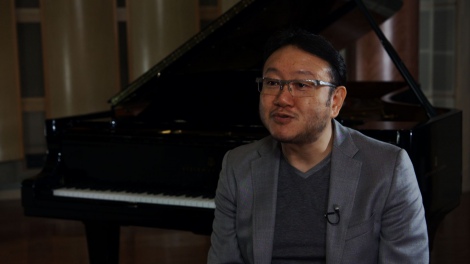
Interview with Mr. Takayuki Hattori (2018/10/19)
Q: Who is the composer behind Gundam: The Origin?
Mr. Takayuki Hattori: My Name is Takayuki Hattori. I was born on November 21, 1965, I'm 52 years old and I live in Tokyo. I studied music at the Conservatoire de Paris National School of Music, Department of Counterpoint Course.
After I returned to Japan in 1988 , I arranged a wide range of artists' albums and concerts, from rock to classical and composed for various films and television shows. I won the Japan Academy Award of Excellence in Music.
My career includes a wide variety of prestigeous projects such as NHK Taiga Drama, Japan-China collaborative production with Shanghai Citi Dance Company "Theatrical Performance" and well-known works such as Godzilla and Doraemon.
Besides this, I am active as a composer with a wide variety of music genres, from "commercials" to "game music".
Q: Could you tell us about your family? The Hattori clan is famous for its musicial legacy.
TH: My wife is a professional violinist, which is highly appreciated in Japan. I also have one daughter, who is also a violinist and has an interest in composing (lol)
Surprising, family composition will continue (lol).
It is a wonderful music family!
My aunt is a singer and my cousin a ballet dancer. My father, grandfather and relatives are both composers too and really amazing. My father, Katsuhisa Hattori, is regarded as one of the most important musicians in Japanese music history.
Classical music always flowed throughout the house. I was handling a lot of music throughout the years and during that time I've become interested in electronic musical instruments as well, even rap. An interest I share with my father (lol)
My Clan is almost a music family and everyone has amazing talent...
Maybe that musical talent is incorporated in DNA ?
It is no exaggeration to say that I was born to do music.
If you are living in such an environment I hope there will be a lot of masterpieces to be born in our family.
Q: What is the annual income of Mr. Hattori Takayuki? I would love to know what is considered average income for your profession.
First, because composition is music work, income is copyright royalties. So it depends on whether the music is adopted, and how well the commerical product is known.
If royalties are popular, songs or pieces, there are also cases where royalties can be hundreds of thousands every year.
Based on such accumulation, I would say the approximate average annual income of composers who work in my field is between 300,000 (3000$) and 15 million yen (132.000 $), which can change drastically each year.
I handle composing and arranging for many years, moreover, for well-known works. The dimensions are too different and it is dangerous to talk about it (lol)
Q: Hattori's family composition and annual income are pretty god level, aren't they?
TH: Normally there is not such a privileged environment but I am very blessed. I think that my daughter was born in a pretty happy environment for musicians and I wonder what future children who are born into it will do, I would like to support the future and success of my family with all I have.
Q: I would like to support the future and success of Takayuki Hattori as well. Thank you for seeing us.
TH: My pleasure. Thank you very much.
Now, prepare for some of his very best work you probably have never heard:
FAREWELL, MR.PREMIER & The history of our house
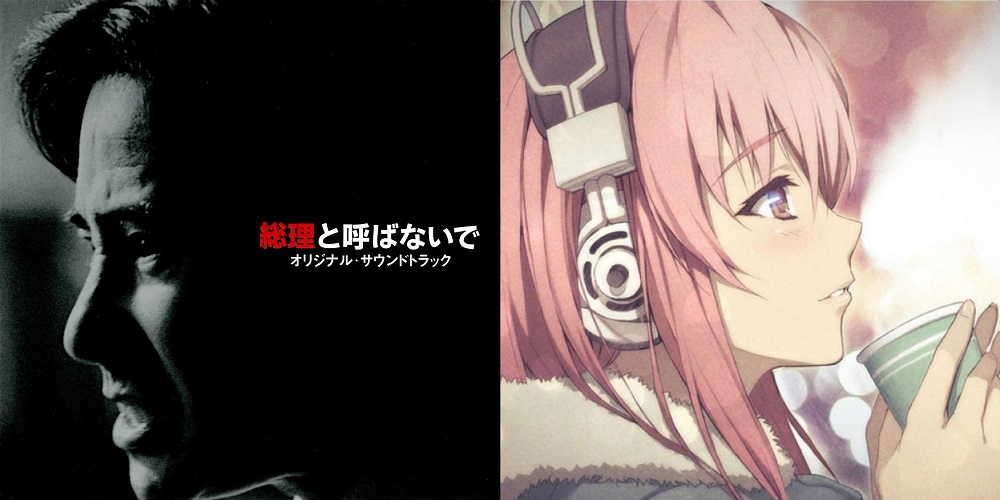
SAMPLE (FAREWELL, MR.PREMIER) (https://picosong.com/wVdVf/) / SAMPLE (History of our house) (https://picosong.com/wVdVm/)
DOWNLOAD (https://mega.nz/#!WmYBzKIR!rek_ZRY5NfPWqo7u7aNMTlvERNhhA8o7sjkYAzy5Iys)
The first is a glorious answer to Sahashi's Madams and Oshima's Ozu Sensei. It's actually a lot simpler than his current work but bold and triumphant, think James Newton Howard's Dave but more epic fantasy, using the full orchestra and chorus, a bit overblown for a mundane political comedy but sort of a Japanese tradition, like Naoki Sato's Priceless. It will lift your spirit. YOu can hear lots of his later scores in that one and apart from the rather muffled sound and one weird fade-out, its among his very best. The recent clips of the final Godzilal movie actually reminds me of it, but with Hattori you never know...
The history of our house feels like a very personal score for Hattori for reasons in the interview above. Its pretty much a musical reflection on the history of a family throughout the decades. Like his Moshidora, the finale is among his very best cues. Its warm and wonderful with lovely melodies, written at the beginning of the decade where he really became a star in the scoring scene.
Moshidora
What If the Female Manager of a High School Baseball Team reads Peter Drucker's Management Book?
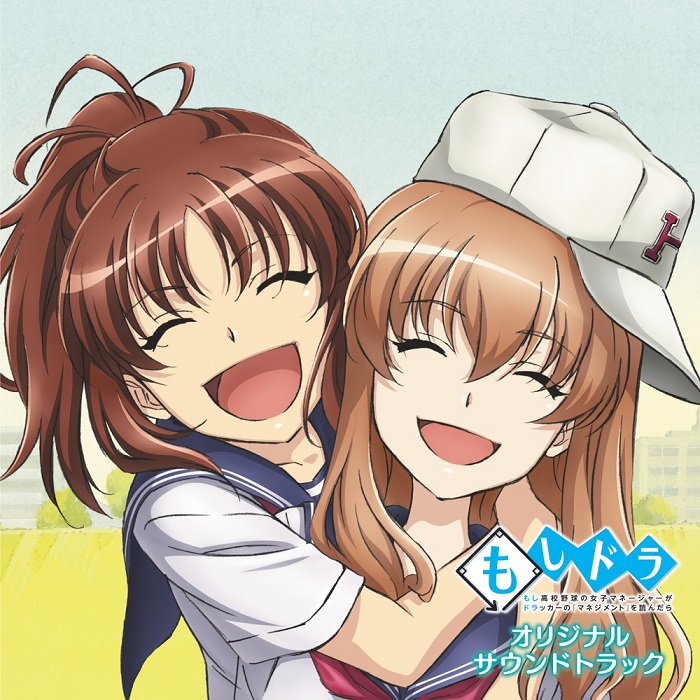
Sample (https://picosong.com/wVzmT/)
Download (https://mega.nz/#!OiIlRQCZ!BoQ7Nq0UvNgqp08JjbJrbzOSwZvUugChJ3ndbEpZ2h8)
It's not Princess Nine, but it has perhaps the biggest finish he ever wrote.
Mobile Suit Gundam THE ORIGIN
Music composed and conducted by Takayuki Hattori
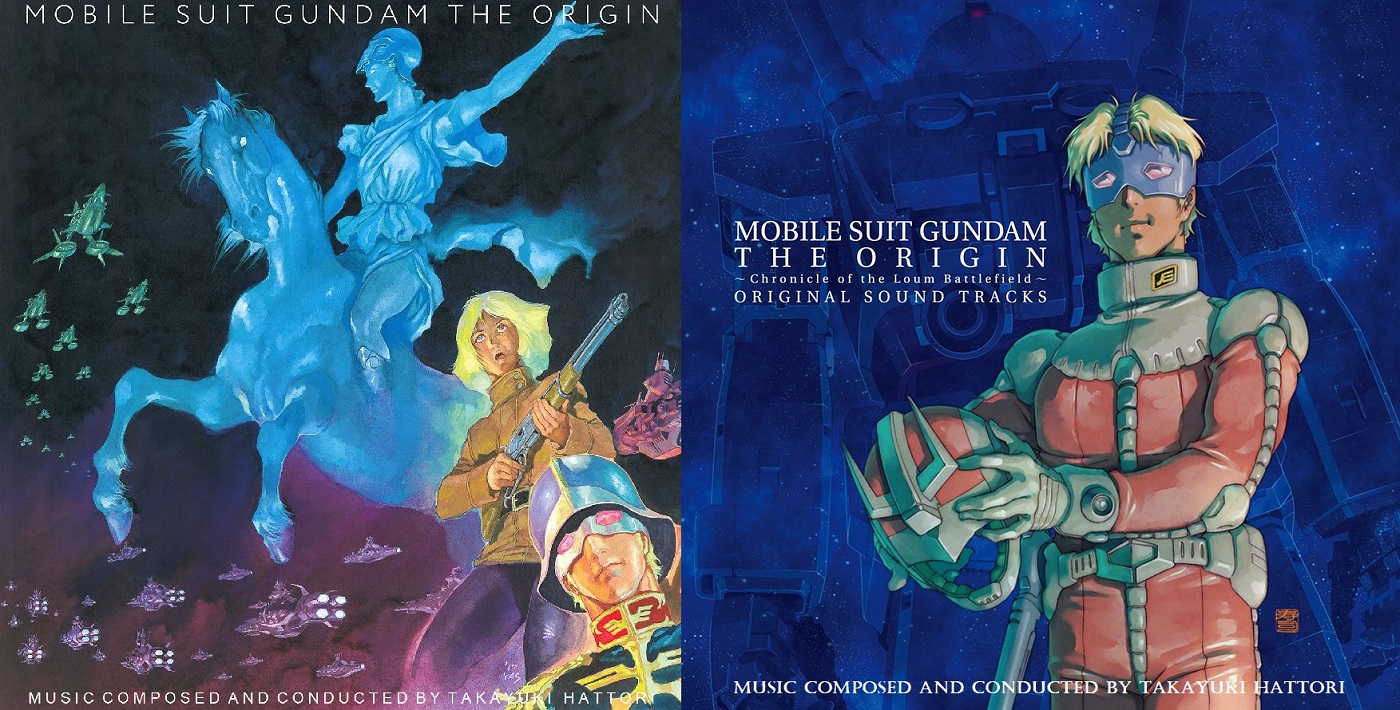
70s FILM SCORE EDITION (https://mega.nz/#!Hy5TmIAR!2FpjfxmsMl0rPUQJ-6rb2Q5T0K4x2vzLlbzWKQ3dzkM) / THE COMPLETE SCORE (https://mega.nz/#!yqwyxL4Y!N1O4ZTU3apw3oI8F8_qzp41Q1DdGpgj9xHoHpRYxap4)
SAMPLE (Classic Hattori) (http://picosong.com/wcVeM/) / Sample (Modern Hattori) (http://picosong.com/wcVP5/)
Here would be a post by Streich telling us a bit how damn good this Theme is if I could actually find it again. THE END.
Gundam The Origin is perhaps the final work of the original staff that worked on Ideon, Five Star Stories, Oldass Gundam series, Yamato 2199 and even the original Space Battleship Yamato. It's the farewell of a generation of SciFi anime space opera creators, their final loveletter to the Space Opera genre. From the retro designs to the original art by Yoshikazu Yasuhiko (cover art) to the (mostly) 70s SciFi musical clothing of Takayuki Hattori. As with Yamato 2199, don't watch it if you hate good anime (you don't even need to watch/like Gundam to enjoy it).
This time I present the score in its full glory, two hours in length as well as a carefully arranged CD of film music that would not sound out of place at all in the 70s, around 80 minutes.
Now for the score, it's my favorite of the "modern" (only really a third of it is) Hattori scores and my favorite Gundam since SEED/DESTINY (14 years ago!!!!!) but that wasn't hard, only Yugo Kanno has a couple of good pieces to show. It's FINALLY Gundam sounding like the 70s again, even more so at times than Sahashi if you ask me, but of course you know who I prefer ;). SEED was goofy and allowed Sahashi to do basically whatever and have fun scoring SciFi in any way he pleased, from Vangelis to Goldsmith. The Origin doesn't really allow for such freedom. First many chuncks are scored to picture, second the story is no fool's play, it's an honest Space Opera, full of drama with high stakes and calling for a more "darker, urgent sound", there's some levity in SciFi conventions but the core of the story/score is tragic and dramatic. Hattori does what he thinks is best, that is a core of pure 70s SciFi like they don't make em no more and the rest is a determination to combine modern elements/style with classic 70s SciFi, incorporating his weird electronic tendencies from his past scores since the 90s and the modern sound palette. I don't mind it at all and compared to Godzilla were he really goes experimental (but in a good way) for the second film, this one barely makes do with the modern tool canvas. It rarely appears in full force, maybe ten minutes total from two hours. But Hattori certainly listened to past Gundam scores before composing this, an uplifting heroic cue with a killer melody sounds like a mix of Sahashi's Justice and Freedom and some IBO, interesting considering this was most likely written before IBO. Other highlights are of course the Zeon march, appearing in modern cloths as well as "classic" ones. It's a march of great urgency and victory of the "bad guys". But the score never is bombastic or "kitsch" even at its most action moments, excluding of course a rock version of the Main Theme as a battle cue, but aside from that the score is very restrained, it's an origin story, not a full-scale conflict yet. It's more textural than drawing attention to itself and sometimes sounding straight out of 60s/70s Television but that's how Japan rolls. Not to mention one of Hattori's best themes ever (especially in the classical variant). If you ask me the score could have used "more obvious" Leitmotif but Hattori is no longer in his younger days. Regardless, in short, I love it and its full of class.
Enjoy
NHK Taiga Drama SANADA MARU
NHK Symphony Orchestra
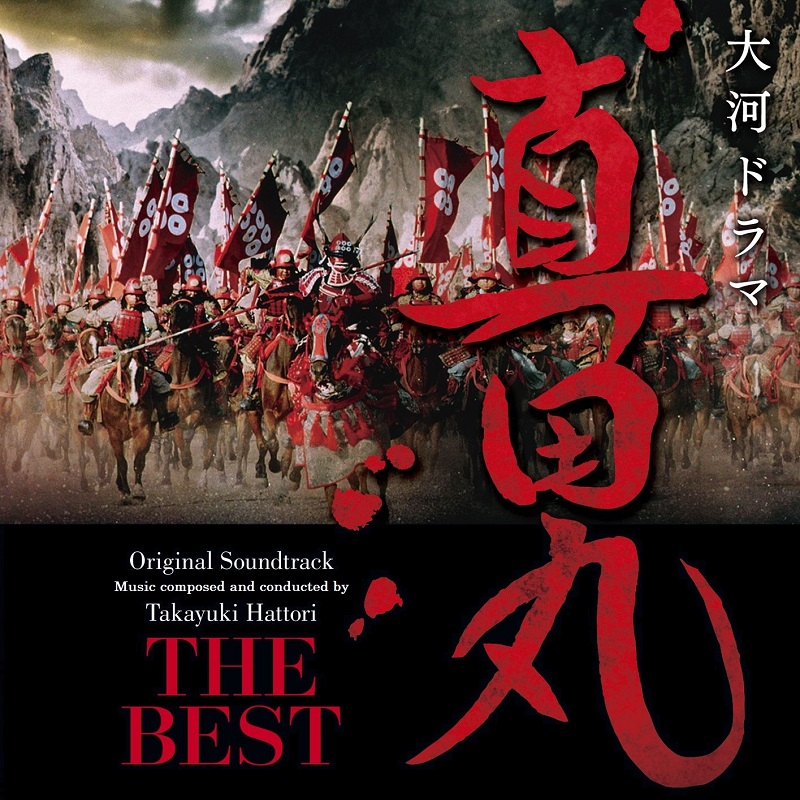
Download (https://mega.nz/#!g6hTVChJ!Z4r0navzXFzJ4--RjbFAhqno1s_KTPmo-9d3LaeQwbI)
Sample (http://picosong.com/w9L84/)
GODZILLA: Planet of the Monsters
Tokyo SOUND INN Symphony Orchestra and the Tokyo Philharmonic Chorus
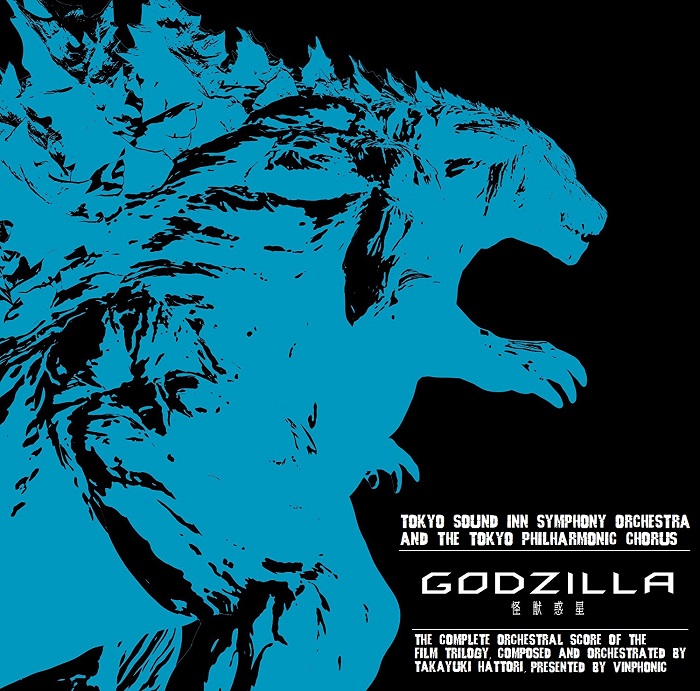
Download (https://mega.nz/#!K7onmYSZ!OJn2nPtAwh-NDGDcUgnIKE4-VqKQtqz2HwNOao3En48)
This is all the orchestral cues plus the vibe pieces with thematic material. I've edited some cues to remove some parts of Hattoris weird tendency of mixing hip-hop/rap beats with 60s Television out of nowhere, in a six minute piece otherwise devoid of it. I think you will not notice nor miss its absence ;)
To sweeten the score a little bit I've also included the outtakes (a few orchestral cues from otherwise electronic heavy scores) from the same session (I'm 99% sure) that were later reused for some television drama and some weird late-night anime. Trust me, they fit right in: example (https://picosong.com/wXysu/) and they belong here. They cannot stand as their own scores but they fit perfectly within the context of the film scores.
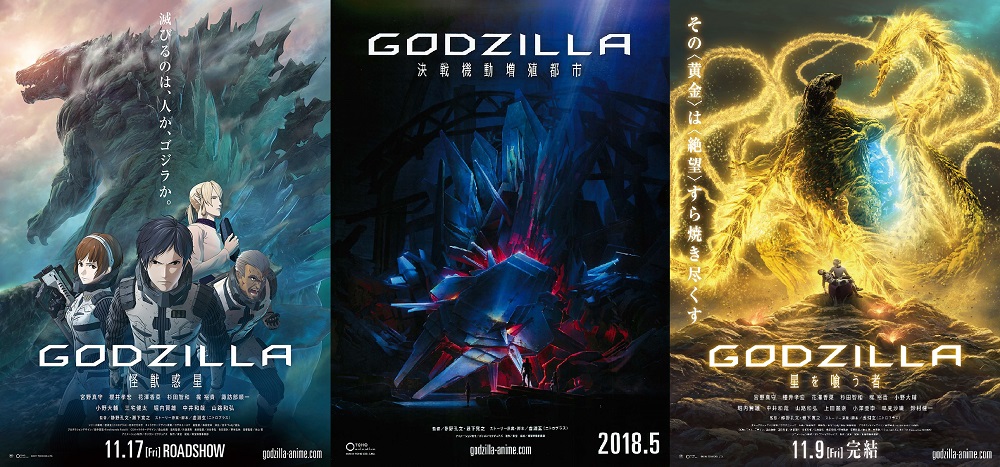
This is certainly a weird trilogy, if you can even call it that, its more of a three-part film if you ask me, because the film scores can not stand on their own, but if you combine them, you get the full picture. Hattori really turns it into another Codebreaker in the final film and the sounds he conjures for "The Planet Eater" and the aftermath is certainly among his very best efforts.
In total you look at three hours of score, full of dark brooding textures and orchestral bombast, fitting for a Planet of Monsters. I also like the little musical hints or styles he employs for Japan's most famous monsters, he also has his very own musical humor in using metal percussion and metal guitar for Mechagodzilla.
The context for the score: Humanity was driven from Earth by Godzilla and after 20.000 years humanity returns to take back the Planet, only to find its crawling with all kind of terrible monsters. After a first attempt at colonization all hell breaks lose. There's a secret hidden under ancient ruins of Earth's long lost civilization and a ritual that calls forth a terrible beast to cleanse the Planet.
The main theme (for the protagonist) is introduced in the piece "Haruo and Godzilla" and it gets a hell of a work out in the final act. Secondary themes and motifs include a homage to Starship Troopers, heard in full in "Leland's Kamikaze Attack", the King of the Monster himself, heared in "Sign", on basson, contrabasson and basses, ancient earth civilization, heard in "20.000 years" and the terrible Planet Eater, which appears in full glory in "Ghidorah". Then there's the theme of recolonization of Earth (in my arranegd album), heared in the very first piece. Then there's various other motifs and musical hints to famous monsters in there so discover them yourself.
The main attraction is the action, in full 50s and 60s glory or with an armada of drum batteries and electronic fury, used deliberately as a storm/stampede of Monsters clashing with human Space Forces in a battle to take back Planet Earth. There's also some attempts at a romantic core/love theme but this is not a happy story.
The musical finale on this arrangened album is one you don't want to miss, the main themes get their last great reprise and if you endure all the terror and claustrophobia, you might make it to a well-earned warm cadence.
As a whole its not his best work but it certainly has some of his best work in it, from the homage to Starship Troopers to full orchestral terror of the 50s and 60s, overall, its a score fitting for the King of Monsters.
His final piece for his Godzilla trilogy is among his most accomplished pieces, pure Golden Age:
The Last One (https://picosong.com/wXyxy/)
Currently Hattori stands at the top of the scoring scene and can get any project he wants. If he decides to lay down the electronic scoring canvas more often (and his hip-hop rap beat elements), I highly anticipiate his next works. Speaking of which I just have this feeling:
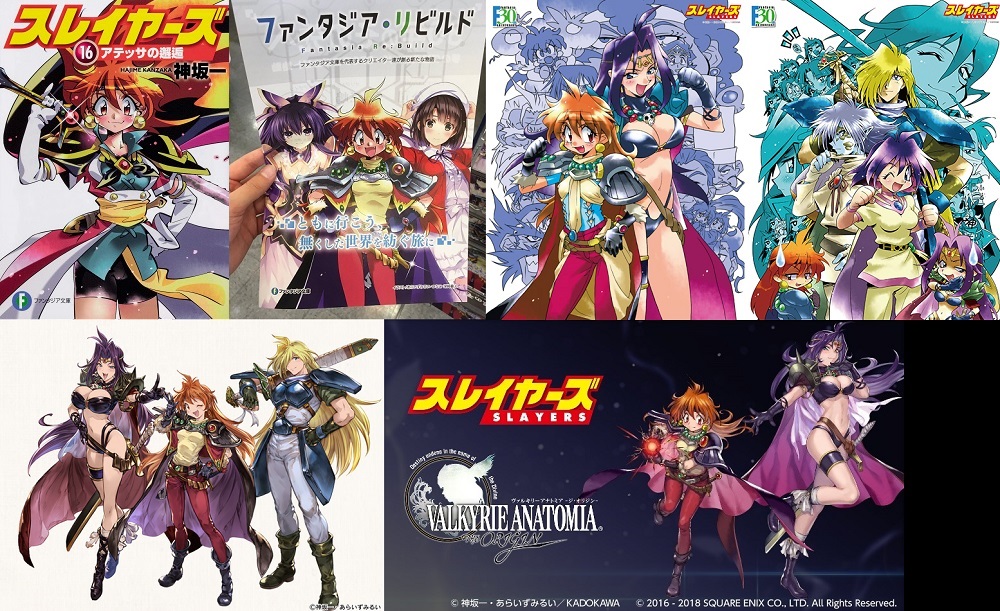
It's coming, you can bet on it (https://www.animenewsnetwork.com/daily-briefs/2018-08-31/1st-new-slayers-novel-in-18-years-ships-on-october-20-in-japan/.136190). Imagine this music (https://www.youtube.com/watch?v=S6dT24DH7Gc) with his current orchestral writing, oh my! It depends if he wants to work on it but I doubt Osamu Tezuka will come back.
Doraemon's Treasure Island
Symphonic Sea Adventure
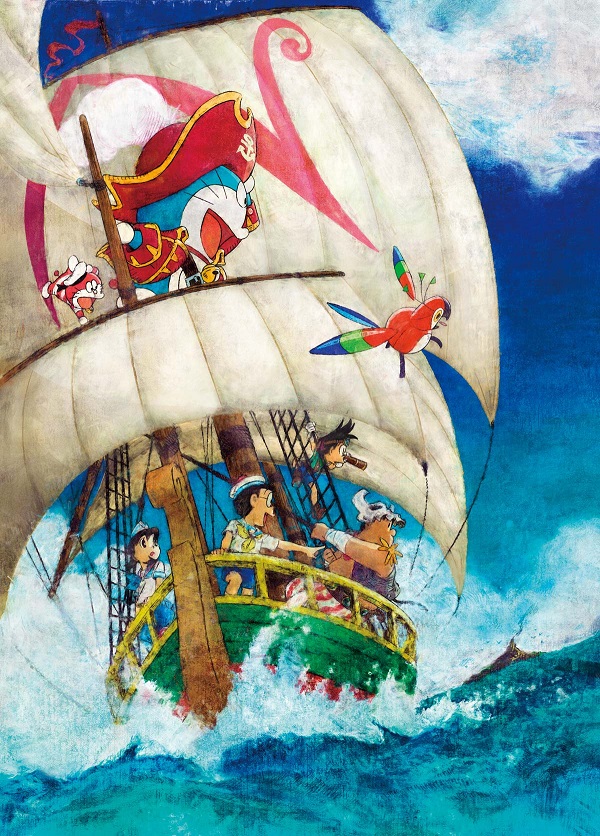
LINK (https://vimeo.com/298476154)
I've extracted the essence of Hattori's gorgeously orchestrated Sea Adventure from the rather disappointing body. You can tell he was called in at the last minute to replace Kan Sawada because he hasitly threw in together parts from Battle Athletes, Gundam Origin and some kids movie cliches. But marvel at these 20 minutes of excellence on a tight schedule, the music of lesser composers would have totally fallen apart. Master orchestrator. I think this is representative of his current musical style when he chooses not to use the electronic scoring tool canvas.
Take on a wild sea ride across the waves, with crew bondings, sea storms, ship battles and sailing into the sunset.
Takayuki Hattori

Takayuki Hattori is a brilliant symphonic mind and master tunesmith. From a certain angle a true Golden Age composer who has composed some of the most memorable TV themes ever and has many fantastic symphonic works under his belt. Like another certain composer I will highlight soon, his best work was written in his early years. Not to say he still can't knock it out of the park but I much adore what he composed for TV Drama and Anime in the 90s. From symphonic works full of grade A Hollywood moments and classical choral works to exhilerating period pieces, it's just all fantastic.
I should mention that some of his early works I don't pocess and to not rip cds all the time, the credit goes to nextday for Kura, Longest Tour and Restaurant. IQ and Nihon Retto were shared by Tango/Herr Salat. The rest is by myself, including Codebreaker in FLAC, which I believe was never shared on this forum (or elsewhere).

Hattori's early TV work gave us quite a symphonic journey, with "Kura" as one of his strongest works to date, elevated in sound by the Moscow Philharmonic and straight out from the Golden Age of cinema with many fantastic choral moments.
His mark on Final Fantasy is also noticable, the iconic themes transformed into an epic choral work. While not reaching the same heights as Hamaguchi/Uematsu, it nonetheless is a worthwhile voyage by another brilliant orchestral voice.
The Longest Tour is a fantastic debut with the same spirit and force as Oshima's early cinema period. Eventhough it is just a studio recording, that warm and sparkling orchestral sound, full of life and splendour, always makes the scores of early Hattori, Asakawa and Oshima a joy to revisit.
Romance of the Three Kingdoms is no stranger to fantastic symphonic music, recently blessed by Yoko Kanno. Takayuki Hattori does not disappoint and adds to the series legacy. But don't be surprised if you find striking similarities with another work of his which I will mention shortly ;)
Restaurant de Roi is just marvelous, a journey into a world of imperial splendour and class, close to a ballet and always an indescribable joy to listen to.
I.Q Intelligent Cube is a score I would put close to Outcast and other western symphonic game works. The score is pretty much classic fantasy with energetic melodies and divine choral moments. It was recently given the concert treatment and I hope we will get to hear it soon.
On to his work for early TV anime (which I adore). Oh boy... I LOVE Slayers (it reprises his work for RotTK). It has a great theme and hours of brilliant classic fantasy and the best of 20th century cartoons. I dearly wish they would be available in FLAC.
Martian Successor Nadesico continues this brilliance, this time in the SciFi realm with some period synths and much classical flair. The movie score is more on the "short" side but still features great moments, in particular the reprise of the Main Theme, which is among my most favorite orchestral beat tracks ever.
If you thought Keijo was the first to combine butts with orchestra, then you're WRONG. Some anime show from the 90s already did that, and with an even better orchestral score I might add. "Battle Athletes" completes Hattori's exorbitant trilogy, with a continuation of classic SciFi and Fantasy moments and yet another fantastic theme. This one especially gets really close to classic Tanaka territory.
Secrets of Mana: Put your thoughts to music is like Final Fantasy another orchestral arrange album by Hattori, while not reaching quite the same sublime moments of his Final Fantasy album, much joy and symphonic fantasy can be found here, with some great guitar and choral moments.
Now we are leaving his 90s period and face quite a different Hattori. In ways more grown up but in other ways not delivering the same kind of music that made me fell in love with his work. His taste for rythmic Hollywood percussion batteries and synth I don't share in particular. But he can still work some magic.
Tears to Tiara is a return to form and an excellent fantasy score with the return of fantastic choral moments straight out of Golden Age cinema, making it one of my favorite fantasy scores in the anime business.
Nihon Retto is a nature documentary in best tradition of British symphonic works written for that genre. Some moments detract a little from the orchestral voyage but nonetheless a great return to form with some absolutely sublime moments.
Karei-naru Ichizoku and Codebreaker show Hattori at his most mature and eloquent, beautiful symphonic works of art and a demonstration what Hattori's work can sound like if he lets his drum batteries rest. Karei-naru Ichizoku in particular can sit right alongside Senju's Red Garden or Rampo with some of the best choral moments I've heared in a Jdrama. Codebreaker is the best of his recent works by a mile, going full noir and evoking Herrmann's works. It's full of brilliant woodwind textures and atonal goodness, almost reaching into the concert world. Still, the drums and electronics are the only things keeping it from greatness.
Gundam: The Origin is a good example of his recent style that does not appeal to me that much, but is still full of great moments. Ironically my least favorite piece from this score is the Main Theme, but only because Hattori can do so much better, and later in the score he gives his theme proper time to shine. Thankfully there's still plenty of fantastic TV ScFi moments in this one. Some of this stuff was absolutely sublime to hear in 2016. And the full orchestral version of the Main Theme won me over in the end. And the Jazz song is quite delicious too. Still, a composer of his caliber can do better and thankfully the recent trailers for the next Origin Arc seem far more promising. And Episode 5 was great.
At last we have two of his greatest themes he ever wrote. A shame the rest of the respective scores did not live up to the utter brilliance of the Main Themes. But they are so great I could listen to them 20 times easily and not miss the full score at all.
LINK IN DESCRIPTION (https://mega.nz/#!Vvo12B5Y!22fsa26Uy37yPNFsSYTJUNHeN5KWwn_YSpQ66HJqx1E)
New scores:
Takayuki Hattori
Japan's Biggest Composer Family

Interview with Mr. Takayuki Hattori (2018/10/19)
Q: Who is the composer behind Gundam: The Origin?
Mr. Takayuki Hattori: My Name is Takayuki Hattori. I was born on November 21, 1965, I'm 52 years old and I live in Tokyo. I studied music at the Conservatoire de Paris National School of Music, Department of Counterpoint Course.
After I returned to Japan in 1988 , I arranged a wide range of artists' albums and concerts, from rock to classical and composed for various films and television shows. I won the Japan Academy Award of Excellence in Music.
My career includes a wide variety of prestigeous projects such as NHK Taiga Drama, Japan-China collaborative production with Shanghai Citi Dance Company "Theatrical Performance" and well-known works such as Godzilla and Doraemon.
Besides this, I am active as a composer with a wide variety of music genres, from "commercials" to "game music".
Q: Could you tell us about your family? The Hattori clan is famous for its musicial legacy.
TH: My wife is a professional violinist, which is highly appreciated in Japan. I also have one daughter, who is also a violinist and has an interest in composing (lol)
Surprising, family composition will continue (lol).
It is a wonderful music family!
My aunt is a singer and my cousin a ballet dancer. My father, grandfather and relatives are both composers too and really amazing. My father, Katsuhisa Hattori, is regarded as one of the most important musicians in Japanese music history.
Classical music always flowed throughout the house. I was handling a lot of music throughout the years and during that time I've become interested in electronic musical instruments as well, even rap. An interest I share with my father (lol)
My Clan is almost a music family and everyone has amazing talent...
Maybe that musical talent is incorporated in DNA ?
It is no exaggeration to say that I was born to do music.
If you are living in such an environment I hope there will be a lot of masterpieces to be born in our family.
Q: What is the annual income of Mr. Hattori Takayuki? I would love to know what is considered average income for your profession.
First, because composition is music work, income is copyright royalties. So it depends on whether the music is adopted, and how well the commerical product is known.
If royalties are popular, songs or pieces, there are also cases where royalties can be hundreds of thousands every year.
Based on such accumulation, I would say the approximate average annual income of composers who work in my field is between 300,000 (3000$) and 15 million yen (132.000 $), which can change drastically each year.
I handle composing and arranging for many years, moreover, for well-known works. The dimensions are too different and it is dangerous to talk about it (lol)
Q: Hattori's family composition and annual income are pretty god level, aren't they?
TH: Normally there is not such a privileged environment but I am very blessed. I think that my daughter was born in a pretty happy environment for musicians and I wonder what future children who are born into it will do, I would like to support the future and success of my family with all I have.
Q: I would like to support the future and success of Takayuki Hattori as well. Thank you for seeing us.
TH: My pleasure. Thank you very much.
Now, prepare for some of his very best work you probably have never heard:
FAREWELL, MR.PREMIER & The history of our house

SAMPLE (FAREWELL, MR.PREMIER) (https://picosong.com/wVdVf/) / SAMPLE (History of our house) (https://picosong.com/wVdVm/)
DOWNLOAD (https://mega.nz/#!WmYBzKIR!rek_ZRY5NfPWqo7u7aNMTlvERNhhA8o7sjkYAzy5Iys)
The first is a glorious answer to Sahashi's Madams and Oshima's Ozu Sensei. It's actually a lot simpler than his current work but bold and triumphant, think James Newton Howard's Dave but more epic fantasy, using the full orchestra and chorus, a bit overblown for a mundane political comedy but sort of a Japanese tradition, like Naoki Sato's Priceless. It will lift your spirit. YOu can hear lots of his later scores in that one and apart from the rather muffled sound and one weird fade-out, its among his very best. The recent clips of the final Godzilal movie actually reminds me of it, but with Hattori you never know...
The history of our house feels like a very personal score for Hattori for reasons in the interview above. Its pretty much a musical reflection on the history of a family throughout the decades. Like his Moshidora, the finale is among his very best cues. Its warm and wonderful with lovely melodies, written at the beginning of the decade where he really became a star in the scoring scene.
Moshidora
What If the Female Manager of a High School Baseball Team reads Peter Drucker's Management Book?

Sample (https://picosong.com/wVzmT/)
Download (https://mega.nz/#!OiIlRQCZ!BoQ7Nq0UvNgqp08JjbJrbzOSwZvUugChJ3ndbEpZ2h8)
It's not Princess Nine, but it has perhaps the biggest finish he ever wrote.
Mobile Suit Gundam THE ORIGIN
Music composed and conducted by Takayuki Hattori

70s FILM SCORE EDITION (https://mega.nz/#!Hy5TmIAR!2FpjfxmsMl0rPUQJ-6rb2Q5T0K4x2vzLlbzWKQ3dzkM) / THE COMPLETE SCORE (https://mega.nz/#!yqwyxL4Y!N1O4ZTU3apw3oI8F8_qzp41Q1DdGpgj9xHoHpRYxap4)
SAMPLE (Classic Hattori) (http://picosong.com/wcVeM/) / Sample (Modern Hattori) (http://picosong.com/wcVP5/)
Here would be a post by Streich telling us a bit how damn good this Theme is if I could actually find it again. THE END.
Gundam The Origin is perhaps the final work of the original staff that worked on Ideon, Five Star Stories, Oldass Gundam series, Yamato 2199 and even the original Space Battleship Yamato. It's the farewell of a generation of SciFi anime space opera creators, their final loveletter to the Space Opera genre. From the retro designs to the original art by Yoshikazu Yasuhiko (cover art) to the (mostly) 70s SciFi musical clothing of Takayuki Hattori. As with Yamato 2199, don't watch it if you hate good anime (you don't even need to watch/like Gundam to enjoy it).
This time I present the score in its full glory, two hours in length as well as a carefully arranged CD of film music that would not sound out of place at all in the 70s, around 80 minutes.
Now for the score, it's my favorite of the "modern" (only really a third of it is) Hattori scores and my favorite Gundam since SEED/DESTINY (14 years ago!!!!!) but that wasn't hard, only Yugo Kanno has a couple of good pieces to show. It's FINALLY Gundam sounding like the 70s again, even more so at times than Sahashi if you ask me, but of course you know who I prefer ;). SEED was goofy and allowed Sahashi to do basically whatever and have fun scoring SciFi in any way he pleased, from Vangelis to Goldsmith. The Origin doesn't really allow for such freedom. First many chuncks are scored to picture, second the story is no fool's play, it's an honest Space Opera, full of drama with high stakes and calling for a more "darker, urgent sound", there's some levity in SciFi conventions but the core of the story/score is tragic and dramatic. Hattori does what he thinks is best, that is a core of pure 70s SciFi like they don't make em no more and the rest is a determination to combine modern elements/style with classic 70s SciFi, incorporating his weird electronic tendencies from his past scores since the 90s and the modern sound palette. I don't mind it at all and compared to Godzilla were he really goes experimental (but in a good way) for the second film, this one barely makes do with the modern tool canvas. It rarely appears in full force, maybe ten minutes total from two hours. But Hattori certainly listened to past Gundam scores before composing this, an uplifting heroic cue with a killer melody sounds like a mix of Sahashi's Justice and Freedom and some IBO, interesting considering this was most likely written before IBO. Other highlights are of course the Zeon march, appearing in modern cloths as well as "classic" ones. It's a march of great urgency and victory of the "bad guys". But the score never is bombastic or "kitsch" even at its most action moments, excluding of course a rock version of the Main Theme as a battle cue, but aside from that the score is very restrained, it's an origin story, not a full-scale conflict yet. It's more textural than drawing attention to itself and sometimes sounding straight out of 60s/70s Television but that's how Japan rolls. Not to mention one of Hattori's best themes ever (especially in the classical variant). If you ask me the score could have used "more obvious" Leitmotif but Hattori is no longer in his younger days. Regardless, in short, I love it and its full of class.
Enjoy
NHK Taiga Drama SANADA MARU
NHK Symphony Orchestra

Download (https://mega.nz/#!g6hTVChJ!Z4r0navzXFzJ4--RjbFAhqno1s_KTPmo-9d3LaeQwbI)
Sample (http://picosong.com/w9L84/)
GODZILLA: Planet of the Monsters
Tokyo SOUND INN Symphony Orchestra and the Tokyo Philharmonic Chorus

Download (https://mega.nz/#!K7onmYSZ!OJn2nPtAwh-NDGDcUgnIKE4-VqKQtqz2HwNOao3En48)
This is all the orchestral cues plus the vibe pieces with thematic material. I've edited some cues to remove some parts of Hattoris weird tendency of mixing hip-hop/rap beats with 60s Television out of nowhere, in a six minute piece otherwise devoid of it. I think you will not notice nor miss its absence ;)
To sweeten the score a little bit I've also included the outtakes (a few orchestral cues from otherwise electronic heavy scores) from the same session (I'm 99% sure) that were later reused for some television drama and some weird late-night anime. Trust me, they fit right in: example (https://picosong.com/wXysu/) and they belong here. They cannot stand as their own scores but they fit perfectly within the context of the film scores.

This is certainly a weird trilogy, if you can even call it that, its more of a three-part film if you ask me, because the film scores can not stand on their own, but if you combine them, you get the full picture. Hattori really turns it into another Codebreaker in the final film and the sounds he conjures for "The Planet Eater" and the aftermath is certainly among his very best efforts.
In total you look at three hours of score, full of dark brooding textures and orchestral bombast, fitting for a Planet of Monsters. I also like the little musical hints or styles he employs for Japan's most famous monsters, he also has his very own musical humor in using metal percussion and metal guitar for Mechagodzilla.
The context for the score: Humanity was driven from Earth by Godzilla and after 20.000 years humanity returns to take back the Planet, only to find its crawling with all kind of terrible monsters. After a first attempt at colonization all hell breaks lose. There's a secret hidden under ancient ruins of Earth's long lost civilization and a ritual that calls forth a terrible beast to cleanse the Planet.
The main theme (for the protagonist) is introduced in the piece "Haruo and Godzilla" and it gets a hell of a work out in the final act. Secondary themes and motifs include a homage to Starship Troopers, heard in full in "Leland's Kamikaze Attack", the King of the Monster himself, heared in "Sign", on basson, contrabasson and basses, ancient earth civilization, heard in "20.000 years" and the terrible Planet Eater, which appears in full glory in "Ghidorah". Then there's the theme of recolonization of Earth (in my arranegd album), heared in the very first piece. Then there's various other motifs and musical hints to famous monsters in there so discover them yourself.
The main attraction is the action, in full 50s and 60s glory or with an armada of drum batteries and electronic fury, used deliberately as a storm/stampede of Monsters clashing with human Space Forces in a battle to take back Planet Earth. There's also some attempts at a romantic core/love theme but this is not a happy story.
The musical finale on this arrangened album is one you don't want to miss, the main themes get their last great reprise and if you endure all the terror and claustrophobia, you might make it to a well-earned warm cadence.
As a whole its not his best work but it certainly has some of his best work in it, from the homage to Starship Troopers to full orchestral terror of the 50s and 60s, overall, its a score fitting for the King of Monsters.
His final piece for his Godzilla trilogy is among his most accomplished pieces, pure Golden Age:
The Last One (https://picosong.com/wXyxy/)
Currently Hattori stands at the top of the scoring scene and can get any project he wants. If he decides to lay down the electronic scoring canvas more often (and his hip-hop rap beat elements), I highly anticipiate his next works. Speaking of which I just have this feeling:

It's coming, you can bet on it (https://www.animenewsnetwork.com/daily-briefs/2018-08-31/1st-new-slayers-novel-in-18-years-ships-on-october-20-in-japan/.136190). Imagine this music (https://www.youtube.com/watch?v=S6dT24DH7Gc) with his current orchestral writing, oh my! It depends if he wants to work on it but I doubt Osamu Tezuka will come back.
Doraemon's Treasure Island
Symphonic Sea Adventure

LINK (https://vimeo.com/298476154)
I've extracted the essence of Hattori's gorgeously orchestrated Sea Adventure from the rather disappointing body. You can tell he was called in at the last minute to replace Kan Sawada because he hasitly threw in together parts from Battle Athletes, Gundam Origin and some kids movie cliches. But marvel at these 20 minutes of excellence on a tight schedule, the music of lesser composers would have totally fallen apart. Master orchestrator. I think this is representative of his current musical style when he chooses not to use the electronic scoring tool canvas.
Take on a wild sea ride across the waves, with crew bondings, sea storms, ship battles and sailing into the sunset.